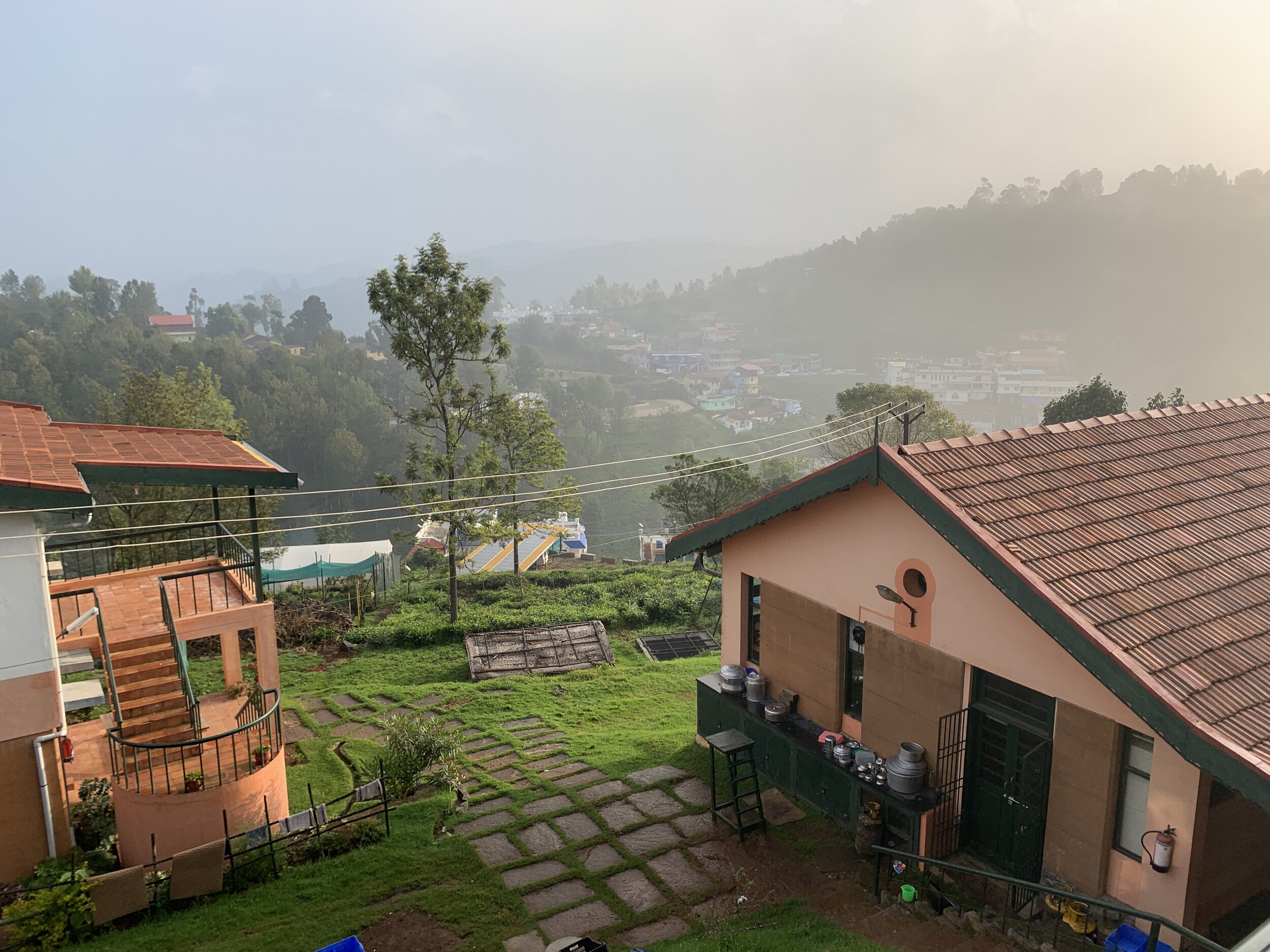
Kotagiri, India
Keystone Foundation
Scenic views of the Niligiris Mountains, near Kotagiri.
Gaur sighting at the Keystone campus.
Shansi Fellows with Keystone friends celebrating Halloween at the Keystone Campus in 2022.
Keystone restoration site near Sathyamangalam, Tamil Nadu.
“On a bus in the Nilgiris, there is always someone willing to help, to hold your bags, to make you hold their bags, to tell you when to get off or to shut the window because you’ll catch a cold.”
The newest Shansi Fellowship is with Keystone Foundation in South India. This Fellowship provides an opportunity for a motivated and independent Oberlin graduate to work with a dynamic nongovernmental organization (NGO) dedicated to environmental conservation and the advancement of indigenous Adivasi communities living in the Nilgiri Biosphere in Tamil Nadu. Shansi Fellows will have the opportunity to gain valuable, first-hand professional experience in one or more of the following fields:
Grassroots Development
Environmental Conservation and Education
Public Health
Arts and Language Preservation
Marketing for socially conscious, fair-trade goods
Documentary Film, Podcast, and Storytelling
Keystone Foundation also offers Fellows opportunities to engage in research and publishing.
** Given visa regulations, the Keystone Fellowship opportunity is only guaranteed for one year. Shansi will consider renewing the Keystone Fellowship for a second year (or shorter) if a fellow is able to renew their visa or hold an OCI card. Renewal is subject to approval by Keystone and Shansi staffs.
Location
Keystone Foundation is located in Kotagiri, a town in the “Blue Mountains” of Southern India. Kotagiri is situated at the edge of the Nilgiri Biosphere Reserve, a UNESCO-recognized protected area with rich biodiversity, including over 3,500 flowering plant species, 450 mammal and bird species, and 315 species of butterflies. The region also serves as home to 15 indigenous Adivasi tribes. Outside of the Biosphere Reserve, renowned tea and coffee estates cover the nearby mountains and hills.
Keystone Foundation and its subsidiary social enterprise, Last Forest, occupy a campus which includes offices, guesthouses, social spaces, and organic gardens in the outskirts of Kotagiri. Popular destinations like Coonoor and Ooty are less than 20 miles away. Larger cities, including Coimbatore, Mysuru, Chennai, Bengaluru, and Madurai are easily accessible for weekend trips.
About Keystone Foundation & Last Forest
Keystone Foundation has been working in the Nilgiri Biosphere Reserve since 1993. Operating with an “eco-development” approach, Keystone has fostered a holistic development model that focuses on the needs of people and the land on which they live. In the past twenty-five years, they have developed environmentally conscious programs that focus on health, livelihoods, social advancement, and well-being of indigenous peoples and local communities in the region.
In 2010, the leadership at Keystone Foundation founded Last Forest, a for-profit social enterprise that serves as a market intermediary for forest produce that is sustainably harvested by indigenous communities. Last Forest provides marketing and fair-trade distribution services for local producers and harvesters of wild honey, soaps, spices, coffee, lip balms, millets, essential oils, and a range of beeswax products.
For more information, visit Keystone and Last Forest Websites.
The Fellowship
Shansi Fellows at Keystone will start off by learning about the organization and its various initiatives, getting to know the dedicated staff and the communities they serve. After an initial orientation period, the Fellow will work with the Keystone and Last Forest leadership to identify a substantive role with at least one of their core programs.
The teams at Keystone and Last Forest are committed to flexible and collaborative approaches when defining the role a Fellow may take at their organizations. After extensive discussions between Shansi staff and Keystone, we’ve outlined the following possibilities for Fellow engagement:
Working with the Community Wellbeing program to develop teaching modules for various public health initiatives (i.e. nutrition and food systems, mental health awareness, etc.)
Designing projects that focus on preserving local indigenous languages
Collaborating with young, indigenous filmmakers and photographers on multimedia pieces
Working with the marketing team at Last Forest to produce various online and social media and advertising campaigns
Helping to develop environmental education curricula for local students, Indian tourists, and international visitors
Collaborating with local musicians and artists on projects that publicize and showcase indigenous arts
Working with the Community Wellbeing program to examine and evaluate data on their programs. Helping the team produce pamphlets and publications for peer-reviewed journals.
After initial engagement with initiatives like these, Fellows are welcome to propose new projects.
What does a strong candidate for the Fellowship to Keystone look like?
This Fellowship is ideal for independent, self-motivated, and patient individuals capable of creatively responding to challenging conditions. It is a unique opportunity to spend two years working at a leading Indian NGO and social enterprise. The Fellows work in a small, fairly remote town and must be open-minded and respectful of local norms and customs.
This Fellowship is open to candidates from any major or academic background. Shansi looks for people who are passionate about intercultural learning and sharing, and who are flexible in unexpected situations. The path from a Fellowship in India can be varied, with recent India Fellows pursuing medical degrees, graduate education in International Relations, and careers in international development.
Language Training
The Fellows at Keystone are trained in Tamil at a language program for 6-8 weeks prior to starting their Fellowship.
Housing
Initially, Keystone will provide the Shansi Fellow with an apartment in a guesthouse of the NGO. However, the Fellow is expected to find an apartment outside of the NGO within a few weeks. The stipend given to Fellows will cover living costs, rent, and utilities, among other expenses.
Calendar
As a non-governmental organization, Keystone Foundation does not follow the academic calendar, and thus there are no established long vacation breaks. Shansi Fellows at similar placements have traditionally negotiated vacation leave that fits within the terms and obligations of their work, and the goals established when they arrive. This has allowed for opportunities for leave and travel.





